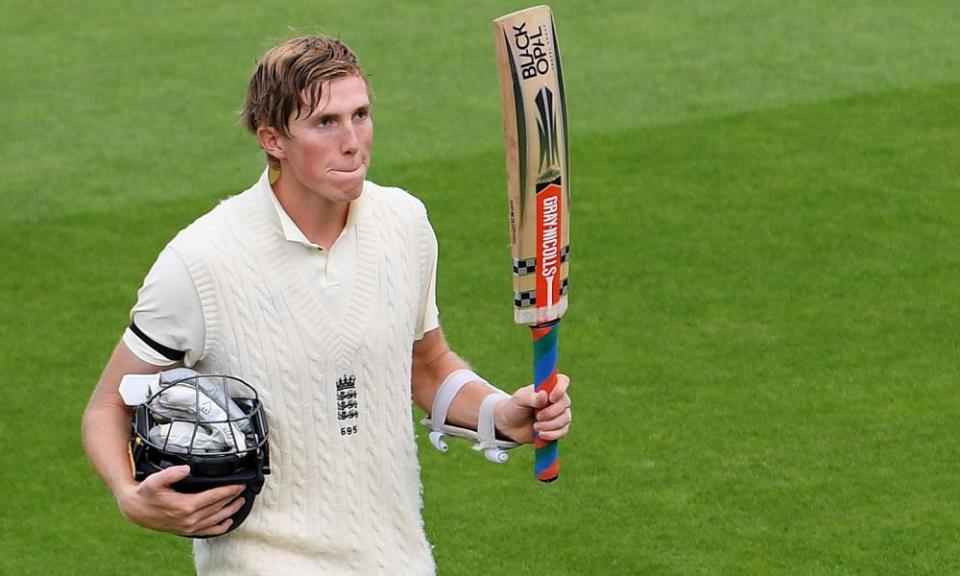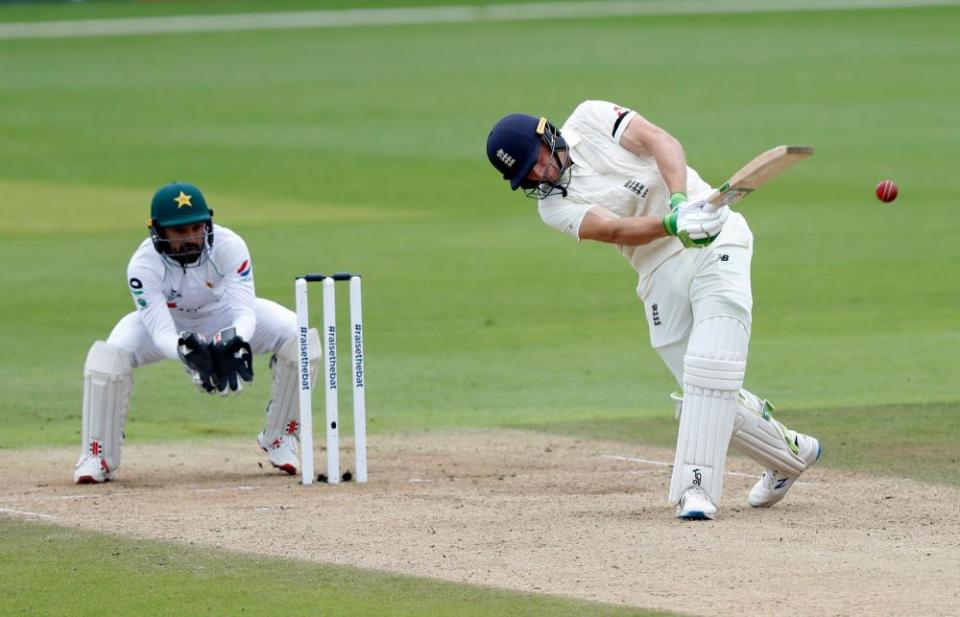Zak Crawley's mammoth century puts England in early control of third Test

Zak Crawley’s maiden Test century came with the minimum of fuss. He had taken tea on 97; on the resumption he took guard against that tormentor of nervous batsmen, Mohammad Abbas; he clipped a two to square leg; then to the last delivery of the over there was a little shimmy down the pitch and a firm push between the cover fielders for two more.
Jos Buttler, still wearing his gloves, shook his hand and the landmark that tantalises every young professional batsman had been achieved. It had been such an uncomplicated process yet this was only the fourth first-class century in this ultra-calm 22-year-old’s career.
Related: England v Pakistan: third Test, day one – live!
Crawley’s unbeaten 171 may be the most important innings of the summer in terms of the evolution of the England team. Certainly it has allowed England to dominate the match. They were wobbling on 127 for four whereupon Crawley joined forces with Buttler and batting seemed easier than at any time this summer. They combined to score 205 runs together in an unbroken partnership that transformed the scoreboard and transfixed the eye. There are no unsightly tics when these two are together.
Crawley came to the crease in the fifth over of the day after Joe Root had won a good toss; the pitch was drier than its predecessor and the wind was gusting, which makes life more difficult for bowlers than batsmen. Rory Burns had just been dismissed by Shaheen Afridi for the third time in an unproductive series for the left-hander – he seems to prefer batting against West Indies bowlers. Crawley’s first delivery was a little too full and a little too leg side and he clipped it with absolute certainty to the square-leg boundary.
So from the very start Crawley looked to score rather than survive. That is his natural disposition and the beauty of his elevation to Test level has been his determination to stay that way. He is a natural strokemaker and he continues to give himself the freedom to play his shots; it looks so simple when it works. Grafting is for Burns and Dom Sibley.
Crawley’s outlook was highlighted by his response to the early introduction of Yasir Shah. With the breeze so strong and unpredictable it was always going to be tough for Yasir, and Crawley seemed to sense that. He was quick to seize on any blemish in length and Yasir’s first four overs cost 21 runs. Even Sibley was keen to be proactive against the wrist spinner; he also advanced down the wicket to punch the ball on the leg side. However this was not such a natural approach for Sibley to adopt and he was correctly given lbw – even though a fair distance down the pitch – by umpire Michael Gough, whose qualities as an umpire have been enhanced in the eyes of an English audience this summer.
Shah was bolstered by this wicket and the run rate slowed. Several times he beat the edge of Root’s bat as the England captain seemed set on cutting good-length balls. Either side of the interval even Crawley was prepared to contemplate some discretion but there was still time to hit the last ball of the session for four to complete his half-century.

After the break he lost Root to a superb delivery from Naseem Shah that was edged to the wicketkeeper. Root paused on his way back to the pavilion to have a look at the replay on the screen. He raised his eyebrows and offered a wry smile, which suggested he was as content as a dismissed batsman can be. There was not much he could have done with that delivery.
This conclusion could not be reached after Ollie Pope’s dismissal. He was deceived by Yasir in the same way as in his last Test innings. Pope was stuck on the crease; he misjudged the length of an anticipated leg-break which turned out to be a straight ball that fizzed off the pitch before clattering into his stumps. The batting coach, Jonathan Trott, may not be quoting Oscar Wilde at him just yet since this is a sympathetic regime.
Life soon became trickier for Naseem. His first ball to Buttler was clipped for four while Crawley was now in the groove, gracefully dispatching anything off target. Naseem tried the odd short delivery against him but this pitch has no great pace and Crawley unveiled a couple of perfectly timed pull shots in between willowy, effortless drives.
After a smooth, bright start Buttler was content to sit back and admire his partner. On 20 Pakistan tried a review against him when he was leaving a ball from Shaheen Afridi, which only served to highlight how they fear what Buttler can do; his bat was nowhere near the ball. Later there was a reminder why they should think like that when he helped himself to two effortless straight sixes against Shah. But Crawley remained the senior partner, impishly reverse sweeping the leg-spinner immediately when he tried bowling around the wicket. The new ball did not bother him much either as 148 runs flowed in the final session. If Ben Stokes returns to the Test team as a batsman only, Crawley will no longer be the man to give way.

 Yahoo Sport
Yahoo Sport 





































